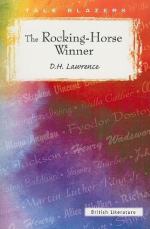|
This section contains 294 words (approx. 1 page at 400 words per page) |

|
Many critics consider Lawrence's short stories his most artistically accomplished writing and have attributed much of their success to the constraints of the form, which forced Lawrence to deny himself the elaborations, diversions, and repetitions that are integral aspects of his longer works. Critics view "The Rocking-Horse Winner" in this light, as an example of economical style and structure in Lawrence's short fiction. Lawrence's early short stories were written in a manner similar to that of Robert Louis Stevenson or Rudyard Kipling, whose anecdotes and tales of adventure epitomized the traditional nineteenth-century English short story. His later short stones, such as "The Rocking-Horse Winner," emphasize abstraction and argument. Critics argue that this story is an example of Lawrence moving away from realism and encompassing a broader range of styles and subjects. They view "The Rocking-Horse Winner" as an example of Lawrence's later period, in which his...
|
This section contains 294 words (approx. 1 page at 400 words per page) |

|




